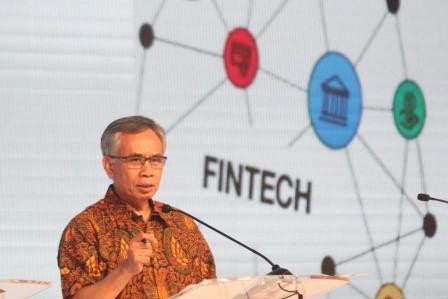Popular Reads
Top Results
Can't find what you're looking for?
View all search resultsPopular Reads
Top Results
Can't find what you're looking for?
View all search resultsLetting BI supervise banks could backfire, experts warn
“This is a political move. President Jokowi should really think about the repercussions,” Indef economist Eko Listiyanto said.
Change text size
Gift Premium Articles
to Anyone
T
ransferring the Financial Services Authority’s (OJK) supervision over banking back to Bank Indonesia (BI) could cause investors to lose confidence in the country, experts have warned.
Institute for Development of Economics and Finance (Indef) economist Eko Listiyanto said on Friday that the move could create more uncertainties in the country’s financial sector amid an already risk-filled COVID-19 situation.
Such a move, he added, could signal that institutions that were supposed to be independent of the government were easily influenced by political interests.
“This is a political move. President Jokowi [Joko Widodo] should really think about the repercussions and impact on investor confidence in Indonesia,” he told The Jakarta Post, urging the government to focus instead on its efforts to curb the spread of COVID-19.
Once foreign investors started to lose their confidence in the country, Eko said, Indonesia would face tougher challenges. Foreign investment could leave the country and weaken the rupiah exchange rate, and it could be harder for the government to obtain funding for pandemic-related measures.
According to a Reuters report, Jokowi is considering issuing an emergency decree to return banking regulation to the central bank because of his dissatisfaction with the OJK’s performance during the pandemic.
The OJK was established in 2011 to oversee financial institutions. It was modeled on the financial services regulatory structure the prevailed in the United Kingdom at the time. The OJK assumed the role of regulator and supervisor of banks in 2013, taking the responsibility from the central bank.
One Reuters source said the government was looking at the French structure, where an independent administrative authority under the central bank oversees banking.
However, presidential expert staff member Dini Shanti Purwono denied the claim. “There has not been any official discussion of the matter so far,” she told the Post.
Neither BI nor the OJK had responded to the Post’s request for comment by the time of writing.
The report came after a Cabinet meeting on June 18 where Jokowi said he would reshuffle the Cabinet or even disband government agencies if he felt they had not done enough to tackle the crises brought about by the pandemic.
The Supreme Audit Agency (BPK) concluded earlier this year that aspects of the OJK’s supervision were not in line with prevailing regulations.
Although Eko acknowledged that the OJK’s supervision was far from satisfactory, he said the government should reflect on its response to the pandemic before accusing the OJK of ineffective supervision.
“The government should remember that this was caused by its delayed response to the pandemic, which then caused disruptions to the real sector and hit the financial sector,” he said.
Indonesia’s loan growth slowed to 5.7 percent year-on-year (yoy) in April, from 7.9 percent recorded in March, Bank Indonesia (BI) data shows. The outbreak has depressed loan demand and disrupted business activity, and some borrowers are facing difficulties repaying their loans.
As of June 22, the country's banks had restructured loans worth a total of Rp 695.3 trillion for 6.35 million borrowers, in accordance with a recent OJK regulation that instructed financial institutions to provide relief for borrowers affected by the COVID-19 pandemic.
Banking expert Paul Sutaryono said the central bank would have to carry heavier responsibilities if the plan went ahead.
“If OJK’s supervision is deemed unsatisfactory, it doesn’t mean the OJK should be disbanded and its supervisory function brought back to BI,” he said. “It would be wiser if the top management was changed.”
“Its supervision needs to be improved – not only its quality, such as human resources and the supervision volume, but also the number of the supervisors,” he added.
Heri Gunawan, a Gerindra politician and member of House of Representatives Commission XI overseeing financial affairs, said a proposal currently on the House’s priority legislation list to revise regulations governing BI might also include discussions about returning the supervisory and regulatory function to the central bank.
“However, I think we should conduct a comprehensive study before deciding on it because it will make BI’s task a lot harder,” he said.










